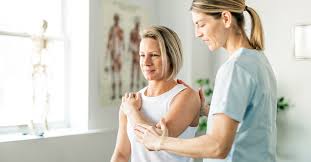
Most shoulder problems do not need surgery and can be treated and managed with good rehabilitation, under the guidance of a qualified therapist. In this section and throughout the website there are pages to help you with useful information, research and methods for managing shoulder pain and disability without surgery.
Benefits of Aquatic Therapy:
Aquatic therapy can be useful in treating a wide variety of conditions including soft tissue injury, bone injury, arthritis, neurological conditions and post –surgery or joint replacement. Aquatic therapy is appropriate for people of any age.
The benefits of aquatic therapy include:
Pilates and its role in Shoulder Rehabilitation:
Whilst patients are working through their specific rehabilitative shoulder exercises, as recommended by their surgeon and physiotherapist, Pilates can be of enormous benefit. It will improve and maintain core stability in both the pelvis and lower back, as well as in the thoracic spine and shoulder girdle.
The Pilates principles of Correct Alignment, Body Awareness, Lateral Breathing and Neutral Spine can be applied to any prescribed exercises, to improve the quality of the exercise themselves.
Pilates will increase joint support, through improved strength in the core muscles of a joint. It will also improve normal movement patterns and correct poor muscle recruitment. This is the order in which muscles are switched on to perform a particular movement. Injury and illness often lead to the correct muscle recruitment patterns being lost.
Choosing A Pilates Teacher:
When looking for a Pilates instructor, particularly if an individual is wishing to recover from an injury, a teacher who is also a Chartered Physiotherapist would be best to approach. The Physiotherapy background coupled with the understanding of Pilates exercises, will enable a teacher to tailor the exercises to the precise needs of the individual.
Post-op Exercises:
For discharge from hospital after shoulder surgery, prior to seeing your own therapist and starting your specific rehab programme.
Rehab Protocols:
These protocols are a guide to the post-operative rehabilitation. Individual surgeons and therapists will differ. These are simply proven programmes we have used, based on our experience, training and surgical techniques. These protocols are not our ‘accelerated rehab protocols’, which need close therapist supervision and may not be applicable to all practices and patients.
Opening Hours at Dr. Chakri's Orthopedic Clinic
Contenental Hospital Timings
Monday to Saturday: 10am-4pm

WhatsApp us